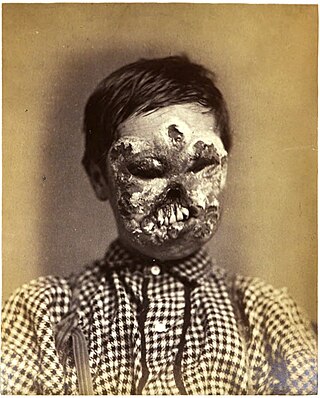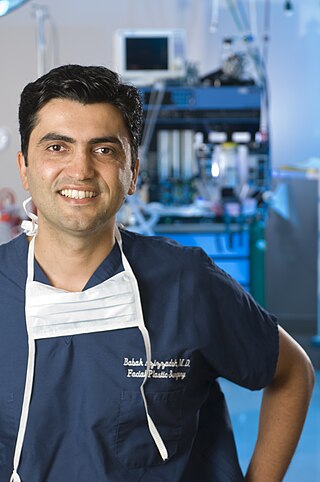Related Research Articles

Plastic surgery is a surgical specialty involving the restoration, reconstruction or alteration of the human body. It can be divided into two main categories: reconstructive surgery and cosmetic surgery. Reconstructive surgery includes craniofacial surgery, hand surgery, microsurgery, and the treatment of burns. While reconstructive surgery aims to reconstruct a part of the body or improve its functioning, cosmetic surgery aims at improving the appearance of it.

Paul Stanley is an American musician who is the co-founder, frontman, rhythm guitarist and co-lead vocalist of the hard rock band Kiss (KISS). He is the writer or co-writer of many of the band's most popular songs. Stanley established The Starchild character for his Kiss persona. Stanley was inducted into the Rock and Roll Hall of Fame in 2014 as a member of Kiss.

Disfigurement is the state of having one's appearance deeply and persistently harmed medically, such as from a disease, birth defect, or wound. General societal attitudes towards disfigurement have varied greatly across cultures and over time, with cultures possessing strong social stigma against it often causing psychological distress to disfigured individuals. Alternatively, many societies have regarded some forms of disfigurement in a medical, scientific context where someone having ill will against the disfigured is viewed as anathema. In various religious and spiritual contexts, disfigurement has been variously described as being a punishment from the divine for sin, as being caused by supernatural forces of hate and evil against the good and just, which will be later atoned for, or as being without explanation per se with people just having to endure.

A facial recognition system is a technology potentially capable of matching a human face from a digital image or a video frame against a database of faces. Such a system is typically employed to authenticate users through ID verification services, and works by pinpointing and measuring facial features from a given image.

A face transplant is a medical procedure to replace all or part of a person's face using tissue from a donor. Part of a field called "Vascularized Composite Tissue Allotransplantation" (VCA) it involves the transplantation of facial skin, the nasal structure, the nose, the lips, the muscles of facial movement used for expression, the nerves that provide sensation, and, potentially, the bones that support the face. The recipient of a face transplant will take life-long medications to suppress the immune system and fight off rejection.

Treacher Collins syndrome (TCS) is a genetic disorder characterized by deformities of the ears, eyes, cheekbones, and chin. The degree to which a person is affected, however, may vary from mild to severe. Complications may include breathing problems, problems seeing, cleft palate, and hearing loss. Those affected generally have normal intelligence.
Oral and maxillofacial surgery is a surgical specialty focusing on reconstructive surgery of the face, facial trauma surgery, the oral cavity, head and neck, mouth, and jaws, as well as facial cosmetic surgery/facial plastic surgery including cleft lip and cleft palate surgery.
Douglas K. Ousterhout is a retired craniofacial surgeon who practiced in San Francisco, CA, United States. His specialty was facial feminization surgery for trans women, and he was widely considered the foremost facial feminization surgeon in the United States. Ousterhout also pioneered facial masculinization surgery for people undergoing female-to-male gender reassignment. Ousterhout received MD and DDS degrees from the University of Michigan Ann Arbor. He is a voluntary clinical professor of surgery in the School of Medicine and an adjunct professor of dentistry in the Dental School at University of California, San Francisco.

Encephalocele is a neural tube defect characterized by sac-like protrusions of the brain and the membranes that cover it through openings in the skull. These defects are caused by failure of the neural tube to close completely during fetal development. Encephaloceles cause a groove down the middle of the skull, or between the forehead and nose, or on the back side of the skull. The severity of encephalocele varies, depending on its location.
Changing Faces is a British charity supporting and representing children, young people, and adults who have a visible difference to the face, hands, or body, whether present from birth or caused by accident, injury, or illness or medical episode. It campaigns to change public opinion and combat discrimination, and to help and support those with a visual difference.

Forensic facial reconstruction is the process of recreating the face of an individual from their skeletal remains through an amalgamation of artistry, anthropology, osteology, and anatomy. It is easily the most subjective—as well as one of the most controversial—techniques in the field of forensic anthropology. Despite this controversy, facial reconstruction has proved successful frequently enough that research and methodological developments continue to be advanced.

Diprosopus, also known as craniofacial duplication, is an extremely rare congenital disorder whereby parts (accessories) or all of the face are duplicated on the head.

Anaplastology is a branch of medicine dealing with the prosthetic rehabilitation of an absent, disfigured or malformed anatomically critical location of the face or body. The term anaplastology was coined by Walter G. Spohn and is used worldwide.
Facing the World is a UK-registered charity, promoting surgery for children with facial differences. It was founded in 2002 by two surgeons, Martin Hirigoyen Kelly and Norman Waterhouse, and was originally focused on bringing children from the developing world to the UK for surgery.

The facial skeleton comprises the facial bones that may attach to build a portion of the skull. The remainder of the skull is the neurocranium.
FaceBase is an NIH-supported initiative that began in September 2009. Funded by the National Institute of Dental and Craniofacial Research, the FaceBase Consortium is a five-year initiative that systematically compiles the biological instructions to construct the middle region of the human face and precisely define the genetics underlying its common developmental disorders such as cleft lip and palate. A range of genetic and environmental factors are thought to contribute to facial clefting and FaceBase is designed to enhance investigations into these causes and their outcomes.
The Children's Craniofacial Association (CCA) is a United States-based nonprofit organization supporting individuals and families with facial disfigurements. CCA is a family support organization recognized by governmental, educational and medical healthcare agencies across the US.

The 2011 Vancouver Stanley Cup riot was a public disturbance in the downtown core of Vancouver, British Columbia, Canada on the evening of June 15, 2011. The riot broke out almost immediately after the conclusion of the Boston Bruins' win over the Vancouver Canucks in game seven of the Stanley Cup Finals, which won the Stanley Cup for Boston. At least 140 people were injured during the incident, including 1 critically. At least 4 people were stabbed, 9 police officers were injured, and 101 people were arrested.

Babak Azizzadeh, MD, FACS is the founder and president of the FPBPF, a non-profit organization committed to the treatment of individuals with facial nerve paralysis and Bell's palsy.
Face equality is a social movement that seeks to normalize and de-stigmatize facial disfigurement (FD), and, by extent, lessen prejudice towards individuals with facial disfigurements. The term and corresponding movement was founded in 2008 by UK-based charity Changing Faces.
References
- ↑ Database record in Revenue Canada – Reg. No. 12676 1410 RR0001
- ↑ "History and Milestones". Archived from the original on 30 March 2012. Retrieved 14 August 2011.
- ↑ PILEGGI, ANNA. "Article – making faces". Archived from the original on 22 July 2011. Retrieved 14 August 2011.
- ↑ "Kids with facial disfigurements confront cruelty with courage". Canada.com . CanWest MediaWorks Publications Inc. 5 September 2008. Archived from the original on 10 November 2012. Retrieved 14 August 2011.
- ↑ Dooley, Danette. "only skin deep". The Telegram . Archived from the original on 12 September 2012. Retrieved 14 August 2011.
- ↑ "Craniofacial Disorders". Archived from the original on 12 July 2011. Retrieved 14 August 2011.
- ↑ "AboutFace". U.S. Department of Health and Human Services. Archived from the original on 9 May 2009. Retrieved 14 August 2011.